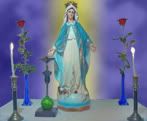The first in a number of scheduled meetings between the Vatican and the traditionalist Society of St. Pius X, known as SSPX, will take place Monday morning, October 26, according to Fr. Federico Lombardi, head of the Holy See Press Office, who made the announcement on Thursday.
Among those taking part in the meeting will be Msgr. Guido Pozzo, secretary of the “Ecclesia Dei” commission, which was set up in 1988 by Pope John Paul II to deal with questions involving this schismatic society. Other participants include Archbishop Luis Ladaria Ferrer, secretary of the Congregation for the Doctrine of the Faith, and various previously named experts including consultors for Doctrine of the Faith, the secretary of the International Theological Commission, and the vicar general of Opus Dei.
Fr. Lombardi said the meeting will take place in the Congregation for the Doctrine of the Faith, adding “the contents of conversations that regard open doctrinal questions will be strictly private.” A statement will be issued at the end of the meeting.
In July of this year, Pope Benedict signed the Apostolic Letter Motu Proprio "Ecclesiae unitatem," making the Ecclesia Dei commission dependent upon the Congregation for the Doctrine of the Faith. In his move to suggest that the remaining issues that divide the SSPX from Rome are doctrinal, the Pope also named Cardinal William Levada, prefect of the congregation, as president of the commission.
Benedict wrote that, “the duty to safeguard the unity of the Church, with the solicitude to offer everyone help in responding appropriately to this vocation and divine grace, is the particular responsibility of the Successor of the Apostle Peter, who is the perpetual and visible principle and foundation of the unity of both bishops and faithful.” He notes that it was in fidelity to this mandate that John Paul II, “following the act of June 30, 1988 by which Archbishop Marcel Lefebvre illicitly conferred episcopal ordination upon four priests, set up Ecclesia Dei.”
The commission’s task, said the Holy Father, is "to collaborate with the bishops, with the departments of the Roman Curia and with the interested spheres, for the purpose of facilitating full ecclesial communion of priests, seminarians, religious communities or individuals until now linked in various ways to the Society founded by Msgr. Lefebvre, who may wish to remain united to the Successor Peter in the Catholic Church, while preserving their spiritual and liturgical traditions.”
In January 2009 Benedict lifted the excommunication of the four men ordained by Lefebvre in 1988 in the hope, he said in the motu proprio, of “favoring the repair of all fractures and divisions within the Church, and healing a wound that is ever more painfully felt within the ecclesiastical structure.” Two years ago, on July 7, 2007 the Pope allowed an expanded use of the Latin rite Mass according to the 1962 Roman Missal.
Thursday, October 15, 2009Among those taking part in the meeting will be Msgr. Guido Pozzo, secretary of the “Ecclesia Dei” commission, which was set up in 1988 by Pope John Paul II to deal with questions involving this schismatic society. Other participants include Archbishop Luis Ladaria Ferrer, secretary of the Congregation for the Doctrine of the Faith, and various previously named experts including consultors for Doctrine of the Faith, the secretary of the International Theological Commission, and the vicar general of Opus Dei.
Fr. Lombardi said the meeting will take place in the Congregation for the Doctrine of the Faith, adding “the contents of conversations that regard open doctrinal questions will be strictly private.” A statement will be issued at the end of the meeting.
In July of this year, Pope Benedict signed the Apostolic Letter Motu Proprio "Ecclesiae unitatem," making the Ecclesia Dei commission dependent upon the Congregation for the Doctrine of the Faith. In his move to suggest that the remaining issues that divide the SSPX from Rome are doctrinal, the Pope also named Cardinal William Levada, prefect of the congregation, as president of the commission.
Benedict wrote that, “the duty to safeguard the unity of the Church, with the solicitude to offer everyone help in responding appropriately to this vocation and divine grace, is the particular responsibility of the Successor of the Apostle Peter, who is the perpetual and visible principle and foundation of the unity of both bishops and faithful.” He notes that it was in fidelity to this mandate that John Paul II, “following the act of June 30, 1988 by which Archbishop Marcel Lefebvre illicitly conferred episcopal ordination upon four priests, set up Ecclesia Dei.”
The commission’s task, said the Holy Father, is "to collaborate with the bishops, with the departments of the Roman Curia and with the interested spheres, for the purpose of facilitating full ecclesial communion of priests, seminarians, religious communities or individuals until now linked in various ways to the Society founded by Msgr. Lefebvre, who may wish to remain united to the Successor Peter in the Catholic Church, while preserving their spiritual and liturgical traditions.”
In January 2009 Benedict lifted the excommunication of the four men ordained by Lefebvre in 1988 in the hope, he said in the motu proprio, of “favoring the repair of all fractures and divisions within the Church, and healing a wound that is ever more painfully felt within the ecclesiastical structure.” Two years ago, on July 7, 2007 the Pope allowed an expanded use of the Latin rite Mass according to the 1962 Roman Missal.
http://www.ewtn.com/news/blog.asp?blogposts_ID=826&blog_ID=1










No comments:
Post a Comment